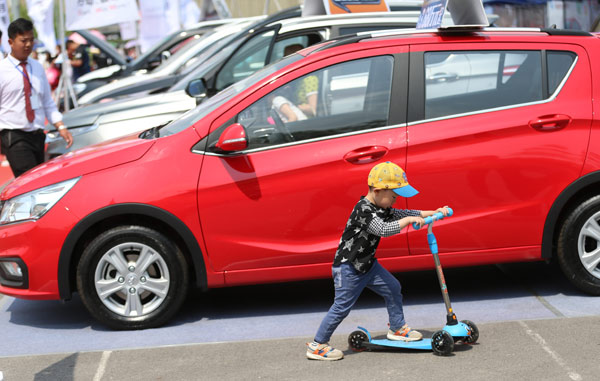
Customers at an auto exhibition in Beijing. ZOU HONG / CHINA DAILY
The idea of borrowing to buy items is not new among young Chinese consumers, who are familiar with buying homes using mortgages.
But compared to the United States and Europe, where 70 to 80 percent of cars are bought on credit, China's car financing market is in its infancy, leaving great potential for farsighted players to explore, such as Yixin Group, a leading Chinese online automobile transaction platform.
According to Zhang Xu'an, CEO of Yixin Group, young consumers, especially those born after 1985, have no such aversion to debt as their parents. Saving cash for future use and buying something with low-rate interest loans is popular among many of them.
"Their understanding of credit is comparatively positive and mature, which offers a great opportunity for e-commerce automotive transaction platforms like us to promote financing deals," Zhang said. His company has just floated 2 billion yuan ($294 million) of asset-backed securities (ABS) on Monday on the Shanghai Stock Exchange, making its total ABS volume exceed 10 billion yuan.
"Shifting to the internet has become almost every industry's solution to development, and the automotive industry is no exception. Buying cars at a traditional dealership often means more time and higher costs, as well as a lack of information, a long transaction period, and insufficient service," said Zhao Xiang, an analyst at domestic internet research firm Analysys.

According to Yixin's findings, it is almost impossible for China's millennial generation (born after 1985) in major cities to buy a car priced above 120,000 yuan with cash because they have limited savings.
As a result, the idea of buying cars on credit has become popular, as the buyer only need to pay between 10 percent and 20 percent as a down payment before buying either a brand new or good-quality used car.
Traditionally, a car purchased with cash is owned by the same user for between five years and seven years, but the introduction of automotive financing may shorten the ownership period to between one and three years.
Chinese automakers' annual production capacity is more than 40 million vehicles, but their actual output is less than 30 million, which means more than 10 million of capacity is in idle.
"When cars change hands at a higher rate, the capacity of automakers won't be wasted, and the efficiency of the market will increase too," said Zhang.
"More than 35 percent of automobile transactions last year involved financing and leasing. We expect this figure to exceed 45 percent this year, and to quickly reach 50 percent soon," said Zhang.
Nearly 30 percent of Chinese car buyers bought on credit in 2015, up from 18 percent in 2013, according to a Deloitte report, which also predicted China's penetration rate of auto retail finance products will exceed 50 percent by 2020.


















































